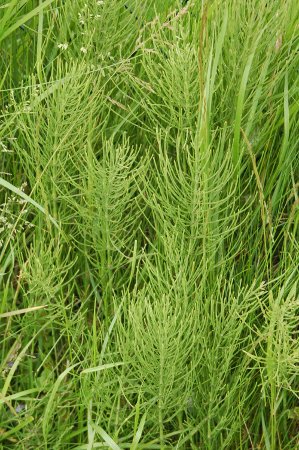I always find I have nothing in common with the management of our community garden complex. They are as far from organic minded as you can get, and they have no sympathy for organic gardeners either. At the same time, they think I have an interesting garden, and recognize me as an experienced gardener, so they always seem to have lots of questions for me that I just can’t answer or mostly just really don’t care.
At the moment everyone’s attention is focused on Horsetail. It’s really everywhere right now. Everyone’s garden is full of it, as well as all the untended open space around the gardens. It’s everywhere that is, except in my garden. I don’t have a sign of it anywhere. Every once in a while it pops up somewhere in my garden, but then goes away on it’s own.
The cause of horsetail is pretty clear. Anywhere you spray with Roundup, you get a serious infestation. Everywhere else the surrounding plants out compete it, and it goes away. Horsetail likes very poor soil, which is how most fellow gardeners do their gardens, with as poor soil as possible, then added fertilizer and other chemicals as needed. Fertile soil promotes weeds, don’t ya know…
So now it’s this urgent problem! Everyone wants to know why I don’t have the problem, and what they can do to solve the problem so they can keep using Roundup. The more serious gardeners have switched to more expensive and toxic weed killers, but other gardeners are too thrifty for this and don’t want to spend the extra money.
The other urgent issue is whenever I have canola/rape weeds in my garden, because I guess those all have the Roundup ready gene by now in our area, and they want to make sure I pull them out as soon as possible before they go to seed! What they don’t know is these are really mustard weeds…
Anyone have any ideas for explaining to my fellow gardeners that I just don’t care what kinds of special weed problems they have after using Roundup?
Anyone with an established organic garden have problems with horsetail? Anyone with an organic garden have problems with other Roundup ‘superweeds’?



I guess the horsetails do what they are supposed to do, repair a mineralized soil. I could easily mineralize my garden soil, just following the garden practice of your neighbours.
I don’t have problems with them, but remember they grew in my garden the first years, but only in small amounts. Back then, I was happy with them, picking them to make herbal tea to strengthen my vegetables. Now my vegetables have to do without.
Patrick, this is SO funny to me because I recall my Grandmother and mother working like dogs to establish horsetail in our gardens. I used to love to pick it for arraignments.
As for what to say, I suggest a shrug and a blank but caring expression.
Thanks Søren and Jo,
You’ve both given me fresh perspectives on this!
I would love to get feed back if you pass this on to your garden neighbors. I’m going to have to actively start looking for horsetail. I haven’t seen it in years and years.
Read all about this superweed on http://www.pfaf.org/user/Plant.aspx?LatinName=Equisetum%20arvense.
I use most of pulled up horsetail as mulching material; I also dry some for tea.
I have horsetail in my garden and love it. I got it on purpose from a nursery that had it growing around a pond. They refused to sell me some, because they said that it is outlawed for being an invasive weed. But I bought a plant there which must have had some seeds in it, because I have it ever since. The places it grows in my garden have not been sprayed with round-up for 9 years, but I do not know what was done to the soil before this. It is true that one of the beds that they grow in has poor soil. However, the other one is amended and the horsetail seems to be just as happy there.
Patrick,
I don’t think the horsetail invasion is related to use of round-up, my garden is full of horsetail, I don’t ever use any weed destroyer, and the farmers surrounding me don’t use round-up, but systemic weed killers. Horsetail has very deep roots, and can survive droughts better than other plants, so, due to the dry years we’re experiencing right now, it has less concurrence and can develop fully.
I also use the horsetail as a mulch (snails don’t like the silica) and add some to the liquid fertiliser (nettles, symphytum,…) I use. There are some theories claiming an effect on fungal diseases, but the effect is minimal.
Frank,
I think it’s related to Roundup in that it isn’t easily killed with Roundup, but most competing plants are killed. I see it especially in areas with a lot of grassy weeds where Roundup was used to kill the grass.
That’s good to know about snails and maybe fungal diseases.
Funny how we look at plants and label them: invasive, desirable, weeds, native, good, bad. For the open-minded, it’s easy to shift perspective on a ‘so called weed’ plant with knowledge and information. For those attached to ‘better living through chemistry’ ideals, weeds are to be annihilated, period. Learning about the roles of plants (especially ‘invasives’) in soil & human health, and sharing that knowledge, is key to shifting away from our constant judgement of plant life. Yes, weeds can tell us a lot about soil health, local air pollution levels, and help bioremediate toxic substances in the dirt. And sometimes other outcomes, like a high yield veggie garden, is wanted. Love,connect,& treat the soil well, what grows will nurture and be beyond definition!